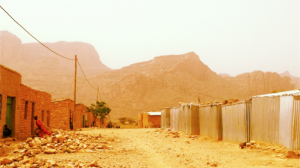Empowering Local Women to Take Charge of Community Health

After a few days in the bustling and construction booming city of Addis Ababa, I felt ready to head north, albeit with a few nerves, to the MVP offices located in Hawzien in the Tigray region of Ethiopia. This was not my first rodeo, right after finishing my undergraduate studies, I had lived and worked in Burkina Faso as a Peace Corps volunteer, but this was definitely entering new territory, geographically and professionally. I was no longer an integrated Peace Corps volunteer, it was my first time in Ethiopia, and I was transitioning into a more professional capacity with skills and a purpose: to pilot an intervention to improve infant and young child feeding practices, nutrition, to ultimately decrease rates of stunting in the MV cluster. Upon arriving in Hawzien with practically no Tigrinya vocabulary, there was not much I could do but to dive right into the work with the Koraro site team and hope my pantomime skills were up to par, at least enough to figure out how to feed myself.
I headed out to Koraro, the cluster’s research village, during my first day in Hawzien to meet and interview a few of the Community Health Workers. I set off with two members of the site team who were distributing mobile phones to the Community Health Workers as part of the Child Count+ program, an innovative mobile health (mHealth) initiative that allows the site teams to track each child’s health indicators. As we headed out of the rural and remote Hawzien to the even more rural and more remote Koraro, driving over bridges and dirt roads that at points dropped off into steep cliffs, I asked how people got around before the road had been built in 2007. The response was by camels, of course. We then proceeded to drive past a group of three camels and a man carrying a monkey on his hip, like you would carry a small child. Welcome to the end of the earth, I thought to myself.
For the next two weeks, I collected background research on community nutrition through an extensive market survey, interviews with Community Health Workers from Koraro and other villages in the MVP cluster, and interviews with Government Health Extension Workers at the health posts as well as the Health Director at the Hawzien Health and Stabilization Center. Essentially, collecting and analyzing this data will help us understand the health and community systems as quickly as possible in order to identify the most appropriate areas for improving infant and young child feeding practices and nutrition. It is important to note that the entire community health system is essentially built on and around mothers and women of reproductive age, between the ages of 15-49. This is critical. Mothers are the ones who access health services the majority of the time, for either themselves or their children. If health services are run by local women, mothers will feel more comfortable and be more likely to access health services, thus improving their family’s health.
As I think about responses to interviews and observations I have collected thus far, it seems that the women, especially the Women Development Army, will be at the center of any nutrition intervention. The Ethiopian government set up the structure of the Women Development Army and the MVP has integrated this system into its work in Koraro. Each village is divided into development units of thirty households and all the women of reproductive age from each development unit make up different groups of the Women Development Army. From each group of the Women Development Army, five women are selected to be leaders, one of whom is a Community Health Worker. Each leader is responsible for an average of five women. The women leaders visit the group of households they are responsible for to check and follow-up on the status of hygiene, childcare practices, health, nutrition, referrals to the health post, and to give any advice and help to the mothers as needed. The health posts in each village in the Koraro cluster are staffed by two female Health Extension Workers, who provide all the basic maternal and child health care services to the community members. Through this system the women are being empowered to participate in improving community health, and mothers are learning from other mothers’ knowledge and positive behaviors in order to initiate sustainable long-term change.
Inhabitants of this area have been adapting and surviving for generations. The holistic approaches of the MVP have made significant improvements in community health, education, and agriculture. Further improvements in infant and young child feeding practices, child nutrition, and child stunting will be critical to facilitate the overall development for the next generations.
This was originally posted on the Millennium Villages website on July 29, 2012.

Comments are closed